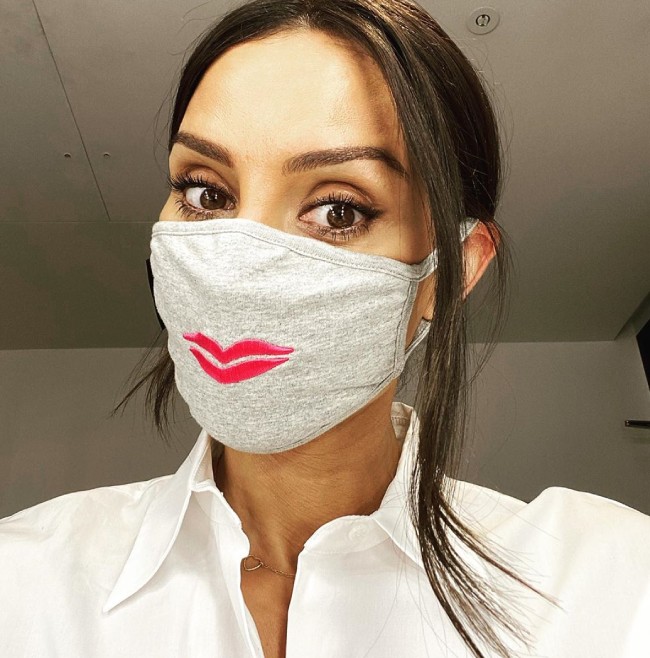
Make It Safe But Make It Fashion
By Adelaide Munro
Year after year, fashion trends evolve. Whether they’re micro trends that pop up for a few months, or classics that last many seasons. We have gone from high waisted blue jeans, leg warmers and miniskirts to the dad sneaker and the biker short – and now it’s about THE MASK.
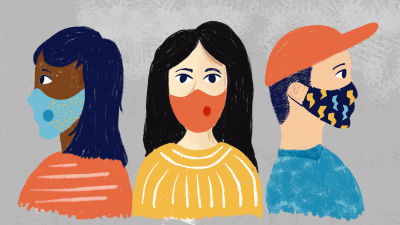
source: vox.com
Fashion trends aren’t just decided by fashion buyers and designers, they are strategic in nature and often align with social and global issues. Perhaps the most unlikely fashion trend at the moment is material face masks. This trend is no accident, it comes down to one word, coronavirus.
A Pandemic Changes the World
This pandemic has completely changed society as we know it today, and with over 42 million cases and 1.15 million deaths worldwide we have entered a new world where we constantly have to think about social distancing, checking into cafes by scanning a QR code and self-isolating if we feel cold like symptoms. The coronavirus is easily transferable through small airborne droplets produced when an infected individual coughs, sneezes, breathes or speaks. Various measures have been implemented to help contain its spread, an important one being face masks. However, there has been much debate globally surrounding whether the public should be wearing masks during the coronavirus pandemic.
A Mask that Makes Sense
The main point of this argument is whether face masks really help prevent contraction of the virus, or whether they hinder everyday activities and have a negative environmental impact? Perhaps one of the most important aspects to this debate is to note that the number of confirmed cases and fatalities, and the level of urgency is disparate in different countries, and thus the regulations are different. In Singapore, mask wearing is compulsory and citizens are fined $300 if they are caught outside their dwelling not wearing one, unless they are eating, drinking or exercising.
In the United States, currently the worst affected country from COVID-19, mask use varies in each state. Some states such as New York have set rules on when to wear them, while others have no regulations in place. Comparatively, in Australia wearing a face mask is advised but not a necessity; particularly when entering public spaces, including transport and in shopping centres as a way of reducing the risk of transmission.
But the wearing of a face mask possesses two-fold benefits. It not only prevents an infected individual from emitting the virus into the surrounding air when they cough or sneeze, but it also provides protection so other individuals do not inhale the contaminated air.
Don’t Waste A Good Mask
While doing research on these face masks I was surprised to come across a document from the Australian Government website advising that the best masks, P2 and N95/ KN95, should only be worn by healthcare workers employed at the frontline of the pandemic who are at the highest risk of contracting the virus.
However, there are other reasons for the advice that the public avoid wearing surgical masks. Firstly, these kinds of masks are too often not used in the correct manner, with individuals not wearing them correctly fitted. Even celebrities have been spotted and criticised for wearing them incorrectly, including the Queen Bey herself, wearing her mask upside down. However, perhaps the most important reason is that although surgical masks protect better than material masks, they are a disposable product and therefore are not intended to be re-used. This means they are unsustainable.
Creative Solutions
It is in this way that although the coronavirus is undoubtedly the worst pandemic in global history, it has successfully transformed a crisis situation into a direct motive, to be sustainable.
I spoke with Molly from Molly and Max handmade, a small home business in Townsville that typically sells material items for children. Normally they sell clothing items including aprons, shorts and tee shirts, but when the COVID-19 pandemic hit Molly saw not only a great business opportunity but a chance to help sustainability efforts. Because of this she stopped making children’s clothing and placed all her focus and effort into creating and selling material face masks. In my interview with Molly she explained that not only is mask making promoting sustainability but it is also a low-cost adjunct to the action of social distancing. This action moves the focus from self-protection to altruism, actively involving each individual, and becoming a symbol of solidarity in the response to the pandemic. Purchasing from a small entrepreneurial business such as Molly’s is also socially responsible and places emphasis on the importance of keeping these businesses afloat during these difficult financial times.
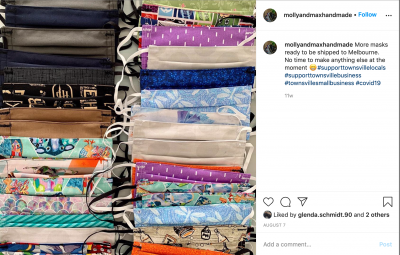
Source: Instagram @mollyandmaxhandmade
And it’s not just Molly and Max Handmade doing this, thousands of brands worldwide have shifted their production efforts in line with the pandemic to craft affordable material face masks out of sustainable materials including hemp, cotton, deadstock fabric and more. The minimal manufacturing costs of these masks make them an ideal response to the pandemic.
Show your Mask!
If there is one sure-fire way of getting a message across to millions of people, it’s through the use of high profile celebrities on social media. In order to help promote the importance of wearing material face masks many celebrities have taken to social media platforms such as Instagram, in an effort to help contain the spread of COVID-19. With this ambition, American fashion designer Tory Burch started a social media campaign in July called the #WearADamnMask challenge. This campaign involved her posting this hashtag and an emotional and impacting message alongside an image of herself in a mask.
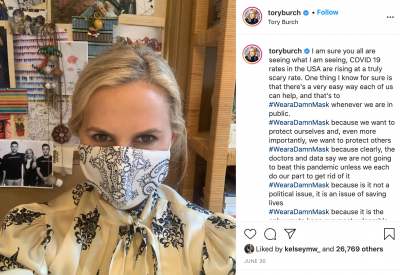
Source: Instagram @toryburch
The end of the post saw Burch tag friends, from actresses to designers, in a bid for them to join in on the challenge.
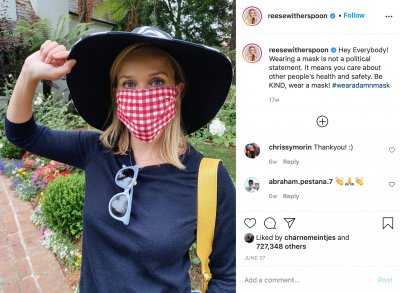
Source: Instagram @reesewitherspoon
The wearing of face masks by celebrities also promotes them as a fashion accessary, making the public more likely to do their part. Similarly, these masks add a layer of individualism to identity and portray the message, you don’t have to conform to be safe. American singer and actress, Miley Cyrus, led this idea on Instagram, showing her playful side by posting a picture wearing a material face mask featuring a large mouth and tongue. Her caption reading, “Category is: Wear a mask for the safety of yourself and others …. but make it fashion!”
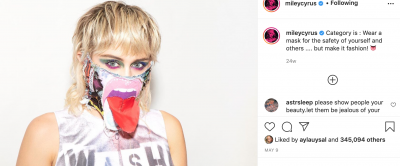
Source: Instagram @mileycyrus
These masks have also been used for groups to campaign messages. In the United States for example, individuals have been seem wearing material masks with captions such as, ‘vote’, in the lead up the 2020 U.S. Presidential election.
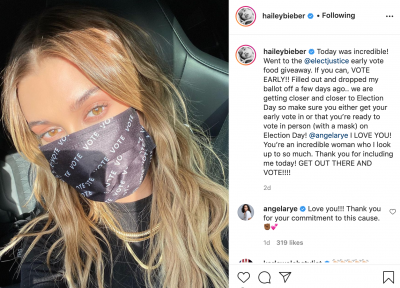
Source: Instagram @haileybieber
The Mask – A Sustainability Message
This action therefore becomes tri-fold, encapsulating the importance of sustainability, promoting a message, and staying safe.
The advantage of material face masks is that they can be washed between wears and used many times, not unlike underwear. In this manner, any one individual would only need a small selection of masks. A well-made mask would last a very long time and therefore there would be little need to dispose of them.
The introduction of material face masks has successfully shown how small impactful actions can be transformed into a worldwide phenomenon that not only keeps people safe but does very little environmental harm while expressing the individualism of fashion.
